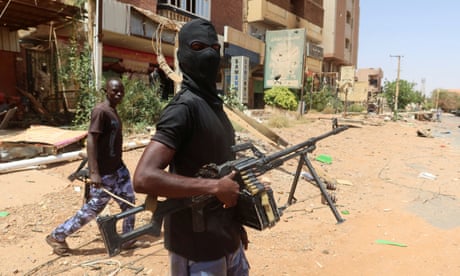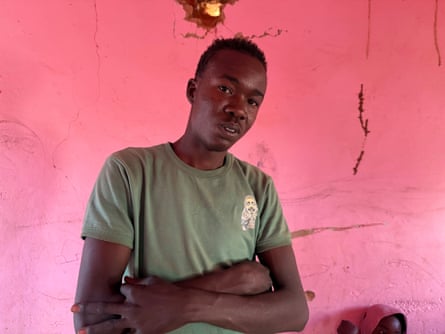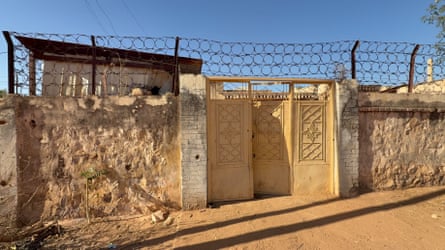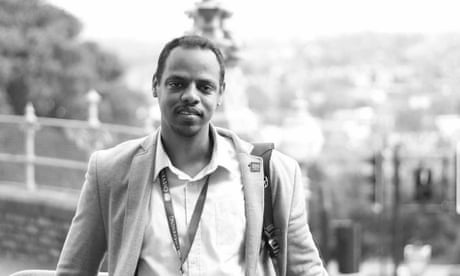“Children of war: six orphans’ 1,000-mile journey across Sudan in search of safety”, The Guardian
Words and photographs by Karl Schembri in El Geneina, Sudan
Fri 11 Apr 2025
After dysentery killed their mother and the civil war came to their home in Omdurman, Haroun and his young siblings were forced to set off on an epic quest to reach El Geneina.
They were huddled together on the bare floor of an abandoned house – four orphans who had travelled nearly 1,000 miles after having to flee from their home in the city when Sudan’s brutal civil war erupted.
Having escaped ferocious fighting around Omdurman, twin city of the capital, Khartoum, they had arrived in Darfur, the sprawling region in western Sudan that has become synonymous with ethnic cleansing, massacres of civilians and widespread gang-rape and sexual violence during the ongoing conflict between Sudan’s armed forces and the paramilitary Rapid Support Forces (RSF).
“But we couldn’t stay, it was too deadly,” says Asrar, 13, sitting beside three of her siblings, twins Mustafa and Mujtaba, nine, and seven-year-old Fatima.https://interactive.guim.co.uk/uploader/embed/2025/04/sudan-zip/giv-32554PO2n24PTmiyM/?dark=false
Outside the house, located in the devastated West Darfur city of El Geneina, another two of Asrar’s siblings were trying to make money for them all to eat: Haroun, 21, working at a mechanic’s workshop, while Abdallah, 15, pounded the streets with a donkey selling water all day.

The six are symbolic of a conflict that has ravaged swathes of Africa’s third-largest country.
Next week marks the war’s second anniversary. It is already the world’s worst humanitarian crisis and all available evidence confirms it is worsening.

An estimated five million children have fled their homes since fighting began, with almost 14 million minors in need of humanitarian assistance.
The orphans of El Geneina do not have to speak to relay the horrors they have endured. Behind them, on the wall of the room where they sleep, are crude drawings depicting the relentless battles that have razed their neighbourhood in Omdurman.
Tanks, artillery, drones and pickup trucks with heavy machine-guns mounted (known as “technicals”) feature heavily.

Asrar and her siblings have been alone since July last year, when their mother, Aisha, died from dysentery at their home in Omdurman.
“There was nowhere to go to treat her. She got sick and was gone in two days,” says Asrar.
Haroun, arriving back at the house after his workshop shift, adds: “We were devastated when she died.”
Their father disappeared before the war started, leaving the house one day and never returning. His children have been unable to reach him on his mobile phone; they presume he is dead.
Left alone as the fighting in Omdurman intensified, the children lost their home and were forced to live on the city’s ruined streets.
Pointing at the pictures on the wall, mostly drawn by the twins, Haroun describes how their neighbourhood was subject to repeated drone attacks. “The fighting was too close for us to stay there,” he says.
Another brother who lives in Libya sent them money by phone to pay a driver to take them to El Geneina, where their parents were from and an elder sister, Israa, 30, still lived.skip past newsletter promotion

Their journey across the vast country forced them to navigate countless checkpoints and pass through towns emptied of residents. Nearly 13 million people have been displaced since the conflict began. “Huge parts of the road felt like a ghost town,” says Haroun.
They paid a driver in advance but he abandoned them along the way. “He left us there with nothing,” Haroun says. “We had already paid him, and we had run out of money, so we had to sell our mother’s perfumes and clothes and survive on beans.”
Strangers gave them money to help pay for them to make it to El Geneina, with the children forced to sleep on streets for several weeks.

On arriving in the Darfur city last month, their elder sister could not be found, most likely having fled across the border to Chad. They found her house in ruins and moved into a nearby derelict house that had been left completely bare after being looted. A threadbare carpet serves as their bed.
Despite escaping Omdurman, life in El Geneina is also fraught with risk. The city has witnessed myriad war crimes, including one of the worst atrocities of the war – a frenzied episode of violence, rape and looting by the RSF in 2023, in which almost 15,000 people were killed.
In January, the US state department formally declared that the RSF had committed genocide during the civil war, committing “systematic atrocities”, many in West Darfur.

For the orphans, hopes of a stable future are bleak. With the conflict about to enter its third year, 17 million Sudanese children are without a school.
Haroun says he has abandoned his aspiration of becoming an engineer so he can look after his younger brothers and sisters.

“I want to register my siblings to go back to school. They’ve missed two years of education already and I want them to get back to learning,” he says.
Neighbours share what little they have – bread, soup, beans and lentils – but survival is a daily struggle. “We live in the hope that this nightmare ends soon,” says Haroun.
Karl Schembri is media adviser for east and southern Africa with the Norwegian Refugee Council